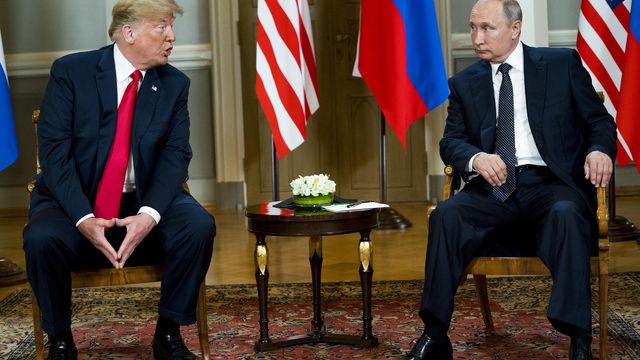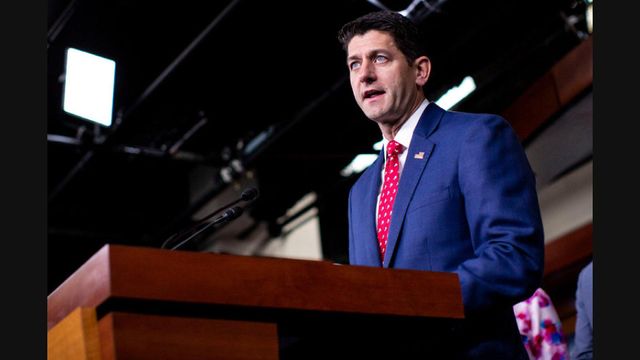The word 'treason' enters the debate as the list of Trump critics grows
In a presidency without precedent, mark another moment for the history books. While the accusation of treason has been thrown around on the edges of the political debate from time to time, never in the modern era has it become part of the national conversation in such a prominent way.
Posted — UpdatedWASHINGTON — After 17 months, three weeks and six days of Donald Trump’s tumultuous presidency, some of his fellow Republicans had finally had enough. “The dam has broken,” Sen. Bob Corker, a Republican critic from Tennessee, said on Tuesday.
For the moment, at least, this time did feel different. After seeming to take President Vladimir Putin’s word over that of America’s intelligence agencies on Russian election meddling, Trump was being accused not only of poor judgment but of treason — and not just by fringe elements and liberal talk show hosts, but by a former CIA director.
In a presidency without precedent, mark another moment for the history books. While the accusation of treason has been thrown around on the edges of the political debate from time to time, never in the modern era has it become part of the national conversation in such a prominent way.
To the president’s defenders, this all sounds like another eruption of what they often call Trump Derangement Syndrome. That he drives his critics to such extremes, they argue, says more about them than it does about Trump. As the president backtracked on his deferential comments at Monday’s meeting with Putin and asserted that he really does accept that Russia intervened in the 2016 election, allies assumed that this, too, would blow over.
But the list of Republicans rebuking the president included not just the usual suspects like Corker, who has been a frequent critic and plans on retiring when his term is up in January, but friends of the president like the former House speaker Newt Gingrich, who called his performance in Finland “the most serious mistake of his presidency,” and the conservative editorial page of The Wall Street Journal, which called it a “national embarrassment.”
Even some of the normally friendly folks at Fox News expressed astonishment, including Neil Cavuto and Abby Huntsman, whose father, Jon Huntsman, is Trump’s ambassador to Moscow.
While Republican leaders like Sen. Mitch McConnell of Kentucky and Speaker Paul D. Ryan of Wisconsin trod more carefully on Tuesday, focusing their fire on Russia rather than the president, they were seeking ways to demonstrate their distance, perhaps with new sanctions on Moscow or hearings to grill members of the Trump administration.
And Republicans were eager to latch onto Trump’s retreat to avoid a confrontation. “I wish he had said it in front of President Putin and the world yesterday, but yeah, I take him at his word if he said he misspoke, absolutely,” Sen. Rob Portman of Ohio said on Fox News.
That Russia would become the third rail for the party of Ronald Reagan is a sign of just how far politics have shifted under Trump. Republicans once denounced President Barack Obama for suggesting that he would have more “flexibility” to work with Putin after his re-election; now Trump treats Putin as a trusted friend.
And that was too much for John O. Brennan, the former CIA director who had already emerged as one of Trump’s most vocal critics. He called the performance “nothing short of treasonous." The late-night hosts Stephen Colbert and Jimmy Kimmel also invoked treason on their shows. The front-page banner headline for The New York Daily News declared “OPEN TREASON.”
Max Boot, the former Republican who has become one of Trump’s sharpest critics, noted in a column on Monday in The Washington Post that accusing him of treason was once unthinkable. No longer. “If anyone is ‘the enemy of the people,’ it is Trump himself,” he wrote.
Trump returned to the White House on Monday night as protesters outside the gate shouted, “Welcome home, traitor.” Even Dictionary.com trolled the president, tweeting out a definition: “Traitor: A person who commits treason by betraying his or her country.”
It later said that searches for “treason” had increased by 2,943 percent. By Tuesday afternoon, the word “traitor” had been used on Twitter 800,000 times and the word “treason” about 1.2 million times.
Even some opponents, however, expressed caution. “The word treason is so strong that we must use it carefully,” Eliot A. Cohen, a former State Department official under President George W. Bush and a longtime critic of Trump, wrote on Twitter. “But that press conference has brought the President of the United States right up to that dark, dark shore.” Trump fired back by calling Brennan a “very bad guy” in an interview with Fox News. Sen. Rand Paul, R-Ky., likewise dismissed Brennan. “This is coming from the guy who voted for the Communist Party USA candidate in 1976,” he wrote on Twitter. “Give me a break.” Brennan has acknowledged voting for Gus Hall, the Communist candidate in 1976, as a rebellious young man “signaling my unhappiness with the system,” but never considered himself a Communist.
Trump’s supporters said the president’s adversaries have gone off the deep end. Lou Dobbs, the Fox Business Network host, said on Monday night that Trump’s opponents overlooked times when Obama tried to influence foreign elections, apparently referring to moments such as when a former aide worked against the re-election of Prime Minister Benjamin Netanyahu in Israel.
Dobbs said Trump had made great progress in foreign policy by crippling the Islamic State and holding unfair trading partners to account. “I mean, these are fools who are prattling off their complaints today about the way he conducted himself in a joint news conference with the president of Russia,” Dobbs said. “It’s idiotic.”
Rep. Matt Gaetz, R-Fla., seconded him. “I would completely agree with that,” he said. “We all ought to start rowing in the same direction. Let’s get everybody to work. Let’s do the great things that the president has fought for the American economy so that we can beat our competitors on the battlefield rather than in sniping at each other through the media.”
Treason is listed by the Constitution as one of the specific justifications for impeachment along with bribery and other undefined “high crimes and misdemeanors,” as the framers put it. “Treason against the United States, shall consist only in levying war against them, or in adhering to their enemies, giving them aid and comfort,” the Constitution says.
No sitting president has ever been formally charged with treason, nor for that matter have many other Americans since the days of Aaron Burr or the political leaders who defected to the Confederacy during the Civil War. The closest was former President John Tyler, who sided with the South against the Union and was elected to the Confederate Congress but died before taking his seat. Franklin Pierce, another former president, was a Southern sympathizer and sometimes accused informally of treason.
Trump’s critics reach for words like treason and traitor because they, like others, are searching for an explanation for actions that are so different from those of his predecessors. Other presidents, including Obama and Bush, sought to build good relations with Putin’s Russia, but none seemed so willing for so long to overlook hostile Russian actions or side with Moscow over the agencies of their own government.
Whether this leads anywhere remains unclear. Past moments that seemed decisive, like the "Access Hollywood" tape and Charlottesville, came and went. For now at least, hurling the treason charge seems more about making a point than making a case in a courtroom or impeachment hearing. But it is an explosive word to use and that by itself suggests how fraught this moment in the nation’s history has become.
Brennan said on “Today” on NBC News on Tuesday that he understood how charged the term was when he used it, but said that the events justified it. “I’m sure Ronald Reagan listening to what Mr. Trump was saying could not believe it and is rolling over right now unfortunately in his grave,” he said.
Related Topics
Copyright 2024 New York Times News Service. All rights reserved.






